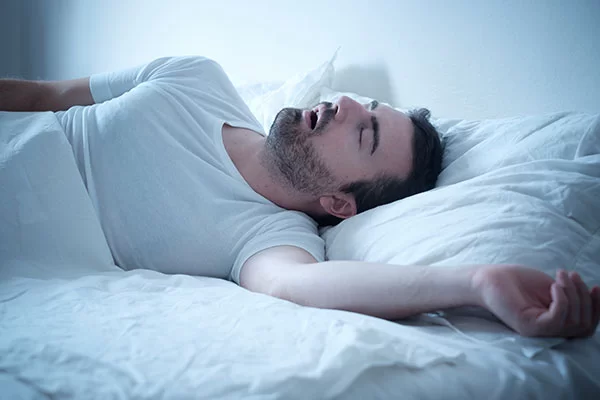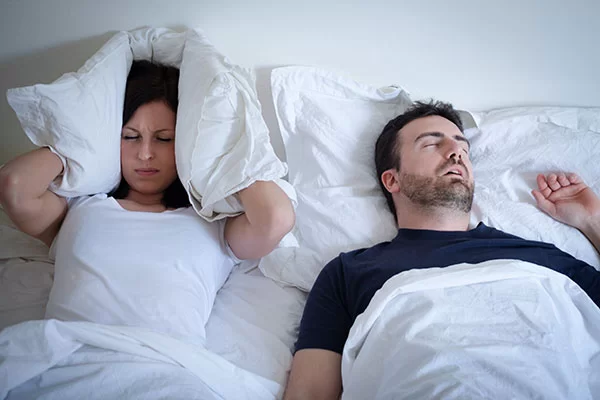Is Your Snoring an Indicator of Sleep Apnea?
Sleep is essential for overall well-being, and disturbances like snoring or sleep apnea can have significant health impacts. While often confused, sleep apnea and snoring are distinct conditions with different causes and health consequences. Both can disrupt sleep, but sleep apnea poses more serious risks if left untreated.
Our Hilliard, OH, dentist is here to explain the differences and similarities between these conditions, helping you understand their symptoms, causes, and treatment options.

What Is Snoring?
Snoring occurs when airflow is partially obstructed, causing tissues in the throat to vibrate. Although it’s not a disorder in itself, persistent snoring could indicate an underlying issue, such as obstructive sleep apnea (OSA).
Common Causes of Snoring Include:
Snoring can be caused by various factors, including:
- Obesity
- Enlarged tonsils or adenoids
- Nasal congestion
- Sleeping position (back sleeping)
- Alcohol and sedative use
- Age-related muscle relaxation
While snoring alone may not be dangerous, it can be disruptive to bed partners and is sometimes a sign of more serious conditions like sleep apnea.
What Is Sleep Apnea?
Sleep apnea is a sleep disorder where breathing repeatedly stops and starts during sleep. These interruptions, known as apneas, may last for seconds to minutes and can occur multiple times per night, causing poor sleep quality and health risks.
There are two primary types of sleep apnea:
- Obstructive Sleep Apnea (OSA): The most common type of sleep apnea, where the throat muscles relax excessively and block the airway.
- Central Sleep Apnea (CSA): Less common, this type occurs when the brain fails to send proper signals to the muscles that control breathing.
Sleep Apnea Symptoms
Common symptoms of sleep apnea include:
- Loud snoring
- Pauses in breathing during sleep
- Gasping or choking during sleep
- Excessive daytime sleepiness
- Morning headache
- Difficulty concentrating
- Irritability
These symptoms warrant evaluation, especially if accompanied by loud and persistent snoring.

Differences Between Snoring and Sleep Apnea
There are a few distinguishing factors between sleep apnea and snoring, including:
- Nature: Sleep apnea involves repeated pauses in breathing during sleep, while snoring is the result of noisy vibration during breathing.
- Health Consequences: Sleep apnea can lead to serious health issues, including cardiovascular problems, while snoring is generally considered a nuisance.
- Diagnosis: Sleep apnea is diagnosed through sleep studies, while snoring is typically diagnosed based on the sound produced during sleep.
- Treatment: Treatment for sleep apnea may involve CPAP therapy, oral appliances, or surgery. Snoring management often includes lifestyle modifications or snoring mouthpieces.
- Symptoms: Sleep apnea is associated with excessive daytime sleepiness, while snoring may not cause significant daytime symptoms.
Diagnosis and Treatment
Sleep Apnea
Sleep apnea is typically diagnosed through a sleep study (polysomnography) that monitors breathing patterns, oxygen levels, and brain activity during sleep.
Treatment options for sleep apnea include:
- Lifestyle changes (weight loss, positional therapy, avoiding alcohol)
- CPAP therapy (the most common treatment)
- Oral appliances (such as the FDA-cleared CARE appliance for those who can’t tolerate CPAP)
- Surgery for severe cases
Snoring
Snoring is often diagnosed based on a physical examination and a discussion of symptoms. In some cases, a sleep study may be recommended to rule out sleep apnea.
Treating snoring can be managed through lifestyle changes (weight loss, avoiding alcohol and sedatives), positional therapy (changing sleep position), and using snoring mouthpieces or nasal strips.
Frequently Asked Questions
Can snoring lead to sleep apnea?
While snoring itself doesn’t cause sleep apnea, it can be a symptom or warning sign of sleep apnea. Persistent, loud snoring should always be evaluated by a healthcare professional.
Are there natural remedies for snoring?
Yes! Natural remedies for snoring include weight loss, adjusting your sleep position, and using saline nasal sprays to alleviate congestion. Lifestyle modifications can often reduce snoring.
Can children have sleep apnea?
Yes, children can have sleep apnea, which is often associated with enlarged tonsils or adenoids. It’s important to identify and treat pediatric sleep apnea to prevent long-term health issues.
Know When to Seek Treatment for Sleep Apnea
If you snore, it’s best to seek a sleep apnea evaluation. While snoring doesn’t always mean you have a sleep disorder, it’s always best to rule it out. To learn more, contact our Hilliard dentist today by calling (614) 771-6060. We proudly serve patients from Columbus, Dublin, Upper Arlington, Grove City, Westerville, and nearby communities in Ohio.





